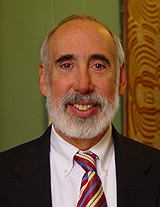Secretariat and enquiries:
Conferences
& Events Ltd
Phone
03 546 6022
Email:
[email protected]
|
This
major workshop event was held in June 2008 in Auckland and Christchurch
 |
Richard Gevirtz, Ph.D. BCIAC
Distinguished professor of psychology CSPP at Alliant International
University
Richard
N. Gevirtz, Ph.D. is a Distinguished Professor of Psychology at the
California School of Professional Psychology at Alliant International
University in San Diego, USA. His research and practice in recent years
has focused on psychophysiological mechanisms and treatment of
disorders affected by the autonomic nervous system, such as IBS,
Non-Cardiac Chest Pain, Fibromyalgia, Generalized Anxiety Disorder,
TMD, Headache, and other muscle pain syndromes. He is the author of
numerous articles and chapters. Richard is a
leading light in this
area of research and practice and we are indeed fortunate to have him
in New Zealand for these two special workshops. |
"Treating
Mind/Body Disorders: A workshop based on the current scientific
mechanisms”
The disorders are: Chronic Muscle Pain, Fibromyalgia, IBS, Headache,
Anxiety.
Bio-behavioural
interventions for “mind/body” disorders: Learning to use the latest
neuroscience discoveries in the treatment of chronic muscle pain
disorders, migraine and tension headache, irritable bowel
syndrome/recurrent abdominal pain, and fibromyalgia/chronic fatigue
syndrome.
In the last several years, scientific evidence has
finally begun to elucidate the complex mechanisms that translate
psychological / emotional phenomena into physical symptoms.
This
workshop covered::
- In detail, the
physiological and psychophysiological mechanisms likely to be mediators
of symptoms such as head pain, muscle pain, gastrointestinal
disturbance, fatigue and allodynia
- laid
out multidisciplinary treatment and protocols for each disorder,
and
- introduced
participants to the powerful techniques stemming from our new knowledge
of heart rate variability (HRV) and HRV biofeedback.
Outcomes:
Each participant was expected to be able to:
- Deliver
an explanation to clients that changes their attribution of etiology
from either psychological or biological to psychophysiological.
- Develop a series of
bio-behavioural tools using available resources to effectively treat
patients with mind/body disorders/
- Develop maintenance strategies to
help patients self-manage their symptoms
Topics covered:
|
Physiology
of mind body
mediators: respiration, autonomic nervous system, HPA axis |
|
Heart Rate Variability (HRV):
basic concepts and measurement issues |
|
HRV
biofeedback. Guided
respiration training using a variety of tools |
|
Mediational model: general
application principles |
|
The
mind muscle connection: chronic muscle pain disorders |
|
Gastrointestinal
disorders: Unravelling the mind/gut connection |
|
Fibromyalgia
and Chronic Fatigue Disorders: the brain fighting off a phantom invader |
|
Wrap
up and short discussion of: anxiety, depression, other disorders? |
TOP
|



